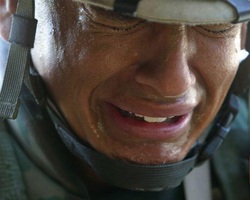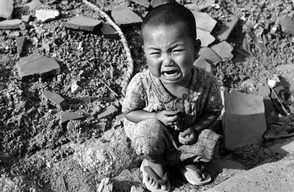"Jesse looked up at the blanket of stars and thought of home..."

television covers Jesse as he lies on the couch. Half awake, he hears a report on CNN. The Obama administration is planning for the possible withdrawal of all U.S. troops from Afghanistan by the end of the year - if no security agreement is reached.
Combat operations in Afghanistan will end this year. For the US to keep forces beyond 2014, an agreement needs to be reached with the Afghan president. President Karzai has refused to sign an agreement, which appears to be a political move concerning the upcoming elections for new Afghan leadership.
A few moments pass. Jesse screams in disgust, throwing a half empty beer bottle across the room. He curls up into a ball and cries.
As a boy, Jesse would play “war” with his younger brother. With make-shift guns and sling-shots, they would run around the neighborhood, chasing the enemy. Their father was prior military and proud. Serving your country and chasing the American Dream were paramount for this American family.
In high school, Jesse was approached by an Army recruiter on Career Day. The recruiter was a good salesman who promised the world to Jesse – travel, adventure and the GI Bill. After graduation, he enlisted for 6 years.
Jesse endured many weeks of training at Fort Jackson in Columbia, South Carolina. This Initial Entry Training is required and necessary before deployment. His MOS or “Military Occupation Specialty” was 11B Infantryman. Of all his responsibilities, Jesse enjoyed reconnaissance the most.
Afghanistan was Jesse’s home for nearly three years. Some days were spent sitting around; entertaining his fellow troopers – trying to get a laugh. Other days involved contact with the enemy. Whatever the circumstance, the soldiers tried passing the time as best they could.
One evening, Jesse and his battle buddy were patrolling south of camp. The air was quiet and the sky was clear. Jesse looked up at the blanket of stars and thought of home - back to the days of Lake Somerville and camping with his family. For that moment, all was well. With a smile on his face, Jesse looked over to his buddy across the road. The soldier asked Jesse, “What are you so happy about?”
There was an explosion and a flash a light. Jesse was knocked to the ground. His buddy was gone – he had tripped an IED buried in the roadway. Jesse scrambled to find the soldier but only found pieces of him spread across the blast area.
In Jesse’s unit, the soldiers shared life and death together. These soldiers were brothers – they were all that Jesse had. They were his family.
It has been three months since Jesse left Afghanistan. He finds himself alone in his living room. Like many soldiers, Jesse has succumbed to addiction and thoughts of suicide.
Soldiers such as Jesse trust their government and are willing to sacrifice. They cling to the words of President Kennedy who said, "Ask not what your country can do for you; ask what you can do for your country!” Our soldiers live to serve America.
Before going to war, we need to ask if the pain, torment and sacrifice to be suffered by our soldiers are worth it. Unfortunately, the campaign in Afghanistan has been unclear. Our purpose has morphed over the years. The US invaded Afghanistan in retaliation for the attacks on September 11, 2001. We were determined to destroy al Qaeda and its ability to support and conduct terrorist activities. Al Qaeda is still around.
Another goal of occupying Afghanistan was to find and kill Osama bin Laden. We killed him in May of 2011. Bin Laden was found in Pakistan, not Afghanistan. Three years later, we are still in Afghanistan.
Other reasons cited for US occupation are the rebuilding of Afghanistan and our strategic interest in the region.
Pulling out of Afghanistan will have terrible consequences. Our absence will ensure Al Qaeda’s survival and its terrorist plans will continue. Our effective rebuilding of Afghanistan will deteriorate – this country will engage in civil war and eventually return to its pre-conflict self.
This is something Jesse battles within his mind. He is happy that his brothers may soon come home but knows if we leave Afghanistan, the country will implode – as if we were never there. Jesse wonders if his sacrifice, as well as those of the soldiers before him matter.
We depend on our government to make the right choices in utilizing our soldiers. To fight for an actual purpose is noble. To fight for an agenda or political reasons is evil.
Light shines through the narrow window, bathing the flag that rests peacefully on the closed casket.
Jesse is dead – gone to meet the buddy he left on that forsaken road in Afghanistan. A bottle of pills took the pain away. No wife, no kids, no future. His life was snuffed by the pains of war.
As the organ plays “The Old Rugged Cross”, Jesse’s mom cries. She walks to the casket and lays her hand across the stars. As the song finishes, her faint whisper can be heard, “I’m proud of you son. I love you.”
The service ends as friends and family slowly walk away. After her last goodbye, Jesse’s mom moves toward the door. She glances through the narrow window and sees a familiar sight. Across a neighboring field, two kids are running around, both dressed in camouflage. With their make-shift guns and sling-shots, they chase the enemy.

 RSS Feed
RSS Feed
